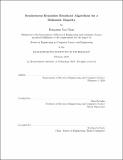Synchronous Byzantine Broadcast algorithms for a dishonest majority
Author(s)
Chan, Benjamin Yao.
Download1102055620-MIT.pdf (259.0Kb)
Other Contributors
Massachusetts Institute of Technology. Department of Electrical Engineering and Computer Science.
Advisor
Srini Devadas.
Terms of use
Metadata
Show full item recordAbstract
Deterministic Byzantine Broadcast requires f+1 rounds for any f malicious processes, in the synchronous, authenticated setting. In the non-deterministic case, Katz and Koo [2] showed a lower-bound of [omega](2n=(n-f)) rounds, but it remains an open question whether the bound is tight, specically when f >/= n/2 (a dishonest majority). This thesis explores ways to improve the eciency of Byzantine Broadcast algorithms for a dishonest majority. In particular, we present an expected 10 round protocol for f = n/2, which works by constructing a hierarchy of quorums, to gather as many signatures as possible, before commitment. Finally, we offer brief commentary on how similar techniques could extend to f > n/2.
Description
This electronic version was submitted by the student author. The certified thesis is available in the Institute Archives and Special Collections. Thesis: M. Eng., Massachusetts Institute of Technology, Department of Electrical Engineering and Computer Science, 2019 Cataloged from student-submitted PDF version of thesis. Includes bibliographical references (page 37).
Date issued
2019Department
Massachusetts Institute of Technology. Department of Electrical Engineering and Computer SciencePublisher
Massachusetts Institute of Technology
Keywords
Electrical Engineering and Computer Science.